Keyword density defines how often a specific search word appears in the text in comparison to the total number of words in it. For instance, if a keyword is in a 200 text document three times, the keyword density is 1.5%. Keyword density is vital because it is one of the factors that have a significant impact on how your page will rank and its visibility on the result pages of search engines.
Keyword density allows you to know whether your text is spammy, or in other words, contains too many keywords. If a keyword appears on a website too many times on a certain page, search engines will put it lower on the search results. However, this is not all there is to know about keywords. Below, we discuss all there is to know about keyword density and search engines.
Facts:
- The first 5 organic results in the SERPs account for 67.6% of all clicks (Zero Limit Web)
- 50% of search queries contain 4 or more words (WordStream)
What Keyword Density is Best?
When it comes to keyword density, there is no right or wrong. Search engines operate by way of search algorithms that favor texts with a higher density of keywords. It was assumed that the more the keyword appeared on the webpage, the more relevant it was. However, website owners were taking advantage of this loophole to stuff keywords even on pages where it was not relevant to improve ratings. As such, keywords were included almost everywhere. It was used in meta descriptions, URLs, and even on the content on the page. Here is an example of keyword stuffing:
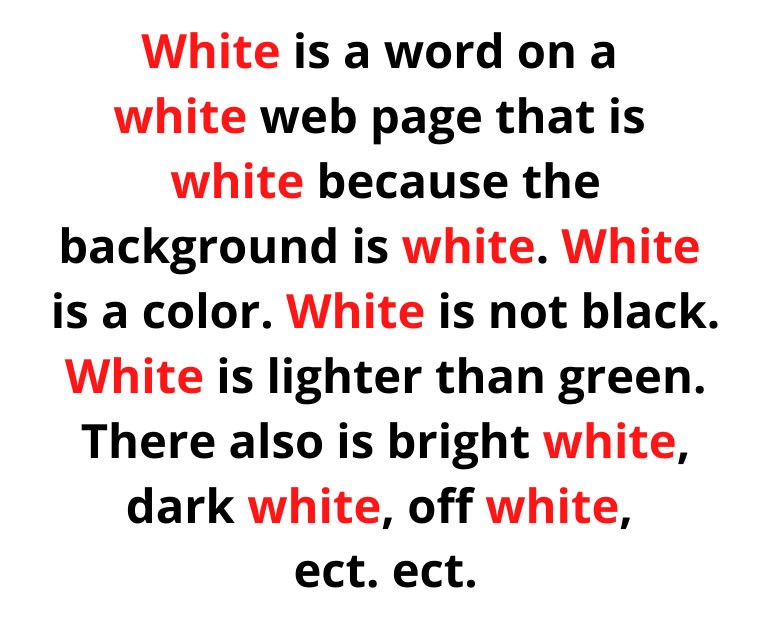
However, keyword stuffing is a tactic that did not last long. Today, search engines do not necessarily rank a webpage higher simply because of the high volume of keywords. While there are no clear-set rules about keyword density, search engine optimization professionals agree that keywords are still crucial if you need your content to rank high on Google and other relevant search engines. However, you cannot just overuse keywords. Google discourages keyword stuffing by penalizing sites that practice it.
Keywords are still used to determine the relevance of content on search engines, even when there are no clear rules. There are things you need to know as you look to check the density keyword before choosing a tool to use.
- Search engines tend to rank sites that use keywords in their titles as more relevant than those that do not.
- Searchers are less likely to click on your link if your meta description does not contain keywords similar to theirs.
- It is vital to use vital within the content because if they are lacking, the search engine cannot determine what the webpage is about.
These rules imply that keywords are vital, but they should be used in the most appropriate way such as on the content and tags. While there is no specific recommended density, keywords are best used as they would in natural speech. Your content should also be engaging and high-quality to attract the right attention from search engines.
From all this, you learn that keyword density can change depending on content. For instance, breaking news would not necessarily need many keywords to rank highly while an evergreen blog post title may need a revamp to rank better as time elapses. Using keyword variants is yet another great way through which you can rank on the search engine, as different searches will use different search terms.
Today, tools that have been developed to make it easy to handle the issues surrounding keyword density.
Improve your content marketing + SEO in 60 seconds!
Diib uses the power of big data to help you quickly and easily increase your traffic and rankings. We’ll even let you know if you already deserve to rank higher for certain keywords.
- Easy-to-use automated SEO tool
- Get new content ideas and review existing content
- Checks for content localization
- SEO optimized content
- Built-in benchmarking and competitor analysis
- Over 500,000k global members
Used by over 500k companies and organizations:
Syncs with 
Top Keyword Density Tools to Use
SEMRush
SEMrush is a well-known keyword density tool. However, this software offers much more than just keyword frequency checking. This is a comprehensive tool that helps in website optimization and monitoring through a variety of pay-per-click and SEO tools. As such, it can be used to fine-tune your search marketing strategy. For example:
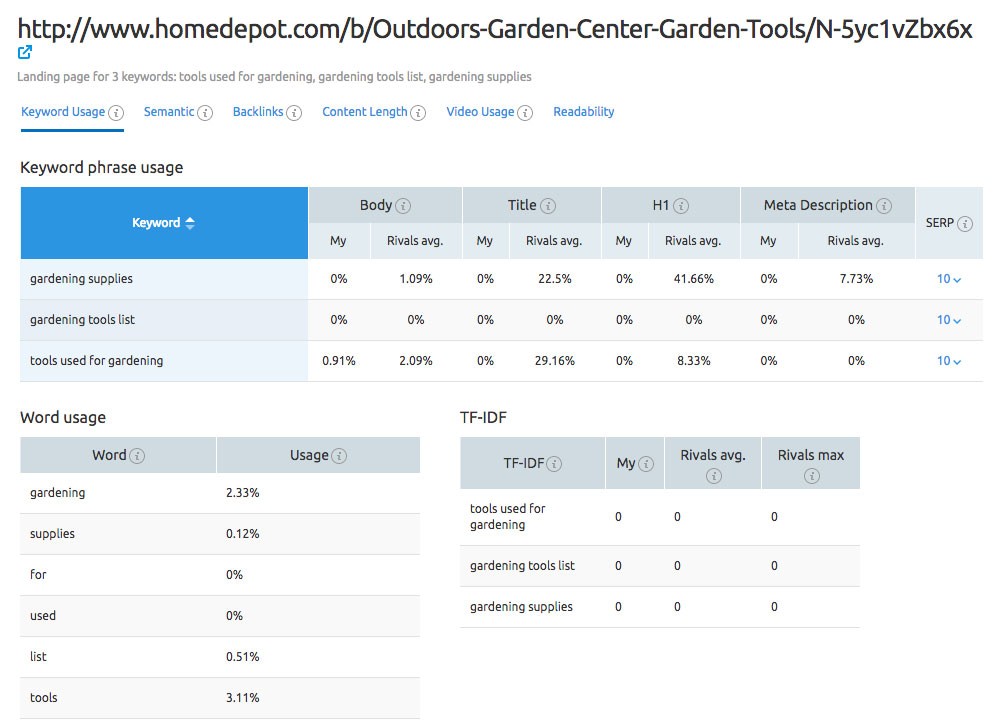
(Image Credit: SEMRush)
There is a SEMRush SEO writing assistant that can be used when creating text. This feature monitors the text as you compose it and gives ideas about how you can use the keywords and even suggests phrases that can be added to the content to increase relevance. Therefore, it can be used as an editing platform to make your work ready before you post it on your website.
It features an on-page SEO checker that will analyze not only your pages but those of rival domains that rank well. In this case, the software will check your content against that of the top 10 result pages and come up with recommended keyword suggestions.
SEMRush also recommends related phrases that can increase your relevance.
You Might Also Like
This SEO keyword density tool comes with a free plan and paid plans for the subscriber to choose from. However, you cannot go wrong with a paid subscription as the software has useful features that could help improve your rankings on Google.
Small SEO Tools
This is a top KW density tool that you can use to analyze the frequency of a keyword on your page. Using it is not complicated. You simply need to enter your page URL or text and Small SEO Tools will do the rest. Designed by the company’s development team, the kw density tool will help you to calculate the keyword density. After the analysis, you will be able to eliminate any unnecessary stuffing of keywords so it is not penalized by Google. This is where you input your URL:
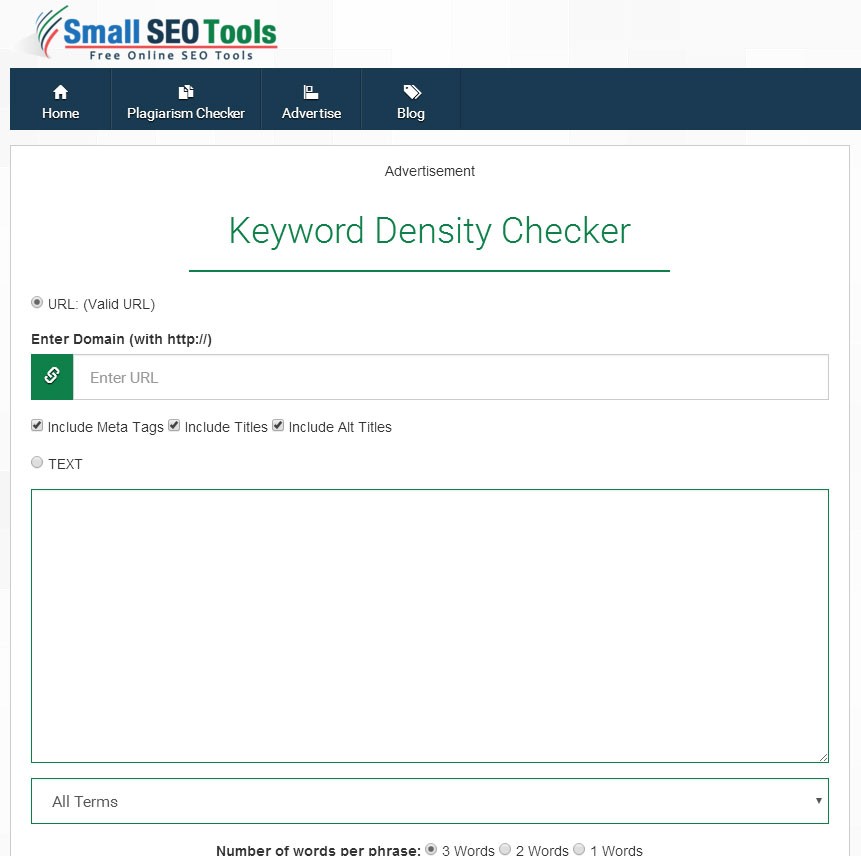
Apart from highlighting keyword density, this tool highlights your site score. The site score is a measure of the optimization on your site and how it ranks on the search engine’s result pages. By understanding the status and metrics of your site, you can make a change. Through the general SEO evaluation, you can check varied SEO elements including titles, meta descriptions, meta keywords, and the headings to determine what should best be done to your content or webpage.
The wide variety of SEO tools featured on the website can help you create unique, user-friendly content and are user-friendly. That means that even a first-time user can have relative success using these tools.
SEOlyze
SEOlyze is a keyword density tool that was designed for on-page and content optimization. To date, it still works efficiently to help interested parties achieve the goal of ranking well in the search results. Once the subscriber registers, they are given access to optimization tools that are based on Google’s TF-IDF algorithm. For instance:
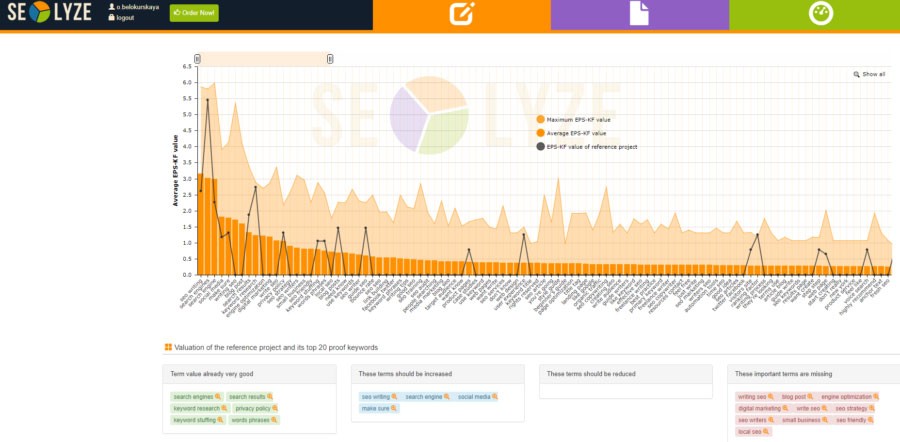
(Image Credit: Business 2 Community)
Therefore, SEOlyze can make a comparison between your website and those of the top 10 competitors for a chosen keyword. You will also be shown which words need to be used more as suggestions of other keywords and phrases are made to help you craft interesting yet useful content for consumers.
The site also helps you monitor the success of your keyword strategy through daily ranking updates. In this way, it is easy to keep up with the competitors and changes related to your field. Their content creation option is also great as it helps in giving amelioration advice and goes through the test as it is input. With a 30-day free trial, you have enough time to determine if this software is the right one for you.
Website Auditor
Website Auditor is an essential site keyword density checker that can be used even by newbies. Through this tool, you can check your site page by page for issues related to optimization and other technical aspects. What is even better is that the site keyword density checker will highlight the issues and explain them to you with the suggested changes.
The site incorporates a term frequency-inverse document frequency (TF-IDF) feature which is similar to the one that Google and other search engines use when ranking websites. The TF-IDF shows how crucial a phrase or word is on a webpage or blog. This means that you are not just looking at keyword density but how your content can be relevant and reach your clients. The inverse term frequency portion scales up important words that appear frequently while disregarding the common words that may appear while contributing little relevance. Whether you are a business owner, SEO expert, or a newbie, this is an on-page and technical SEO guide that you can use to increase online traffic to your website and to help you meet the demands of your customers. Here is an example of the TF-IDF tool:
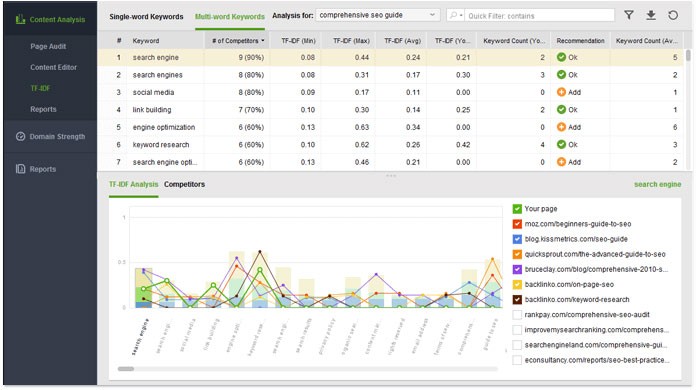
(Image Credit: Business 2 Community)
Through the technical website audit, you can understand the technical issues that can affect your ranking and indexation. There are issues including broken links, duplicate content, internal links, site speeds, and heavy scripts and pages, and thin pages. With Website Auditor, you can see the list of SEO errors that feature on your website during the audit and find instructions about how to fix them fast.
This word density tool does more than just check density keywords by featuring a sitemap generator and robots.txt. These tools help you create SEO files in a short time, and they are beneficial because they will not interfere with the syntax.
Therefore, if you are using the word density tool, you get a peek into how you are performing against the competitors and how you can work better to raise your ranking.
SEObility
This is yet another outstanding SEO keyword density tool in the market for marketing gurus and all who care for SEO.
By simply inputting a keyword for checking, the website will provide you with a list of other relevant keywords that you need to include to beat the competitors. It also utilizes the TF-IDF software and gives a score and gives you details concerning the top 10 competitors so you can understand keyword density on these sites as well. Their daily keyword monitoring ensures that you know how your keywords are ranking every day as they employ features such as keyword tagging to keep track of your performance and that of your competitors.
Apart from the keyword density-related features, the software features an on-page SEO audit. It will crawl all the pages on your website and collect any on-page related problems before displaying them. You will get tips and recommendations about how to best fix these problems, not just one time, but regularly, according to your schedule.
The software also offers backlink monitoring, which is essential because it encompasses all the details about the backlinks, referring domains, and anchor texts. If there are any mishaps such as missing links, you will get actionable link-building suggestions that will keep your site up-to-date and ensure top-notch performance. Therefore, this software is important not just for the keyword density, but for other aspects of SEO as well. For example:
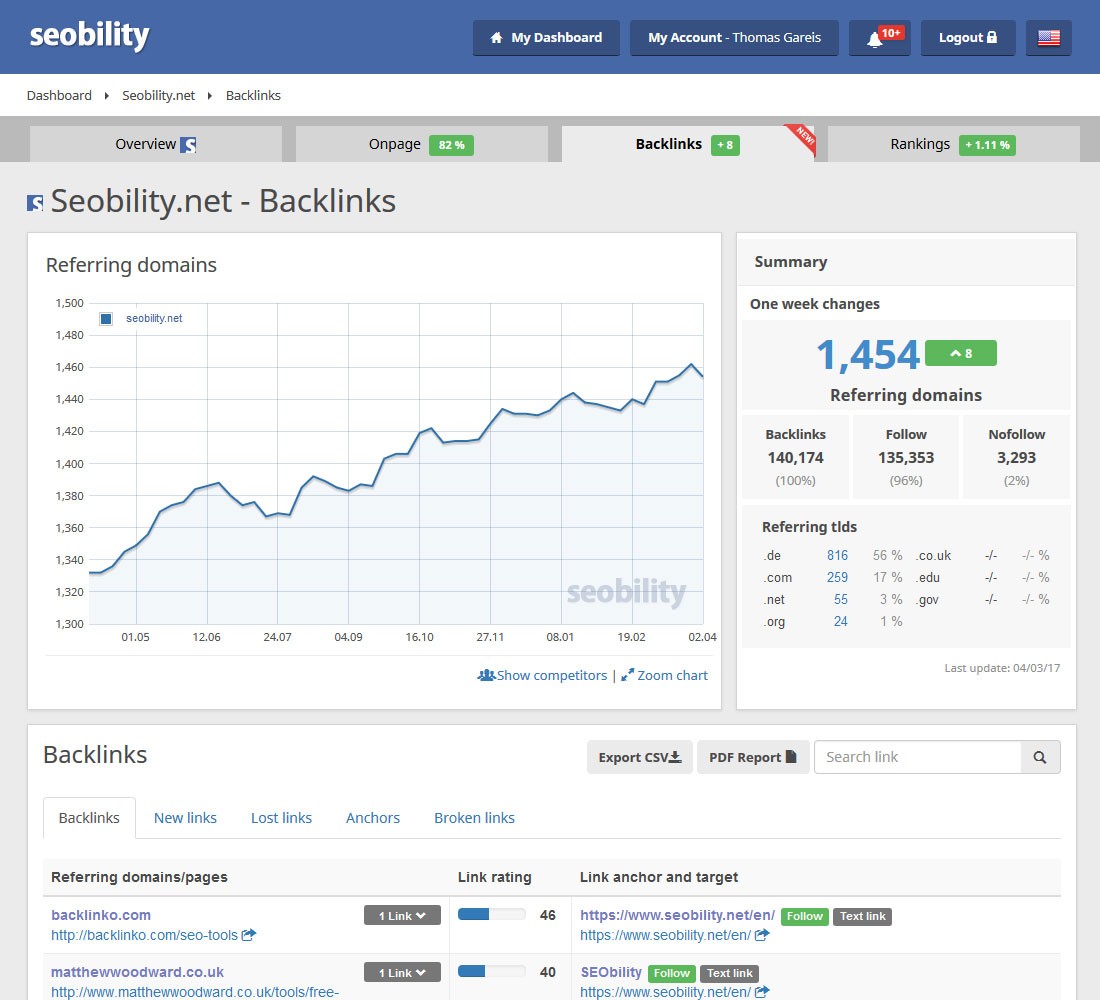
(Image Credit: SEObility)
We hope that you found this article useful.
If you want to know more interesting about your site health, get personal recommendations and alerts, scan your website by Diib. It only takes 60 seconds.
Ryte
Ryte is yet another keyword density tool that allows you to analyze, optimize, and monitor your site. Just like Website Auditor, this software utilizes the TF-IDF software that will suggest keywords based on the top-ranking competing sites on search engines such as Google.
Apart from these recommendations, the software will show you how to best use the keywords to your advantage. With already written content, this software will suggest the primary phrases that you need to incorporate for success.
The site also allows you to analyze your site and fix any issues that may be affecting your performance. You also get a chance to analyze your performance and get notifications when there are any changes in performance. Any underperforming keywords will be flagged and you will be notified so you can take appropriate action.
To ensure content success, Ryte utilizes the content success feature to help you as you create your content. You will get content ideas, comparisons with the competitor’s content, and monitoring of performance, which is important because now, users are not only looking for relevance in content but the freshness and its ability to hold their attention.
As of today, the website has almost 2 million users worldwide and has been of great help to individuals who are looking to improve on aspects such as website usability, traffic, and conversion rates. It is a favorite among marketers, content makers, and webmasters. To top it up, this software is easy to use and can even be utilized by those who are new to it.
Even though there are paid plans, you can sign up and utilize the free package that still has amazing features before deciding to move to the paid plans.
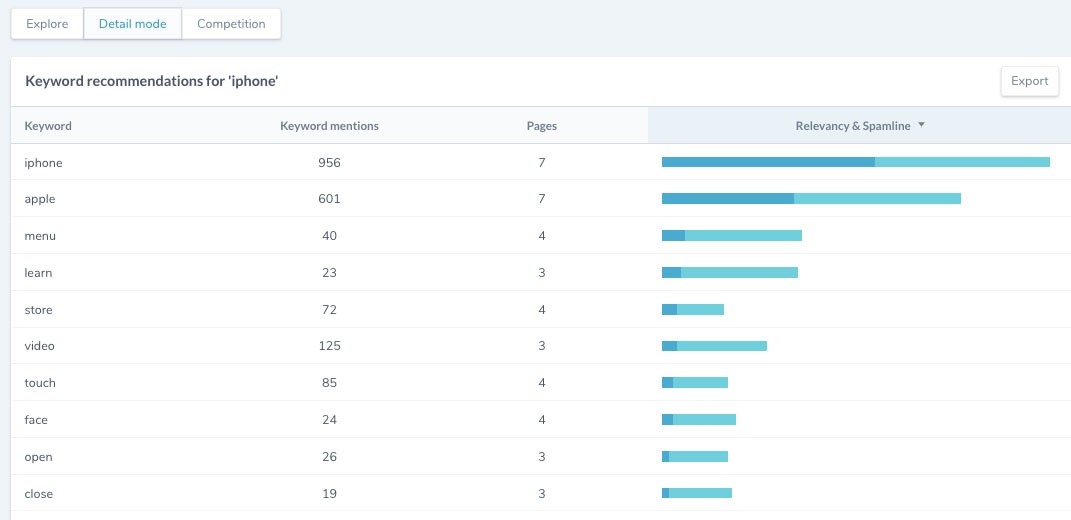
(Image Credit: Ryte)
SEO Review Tools
Yet another outstanding wood density tool is the SEO Review Tools. While the website appears simple, it is effective and it comes with a variety of useful features. The software will quickly and efficiently calculate the keyword density in your text or webpage. For instance:
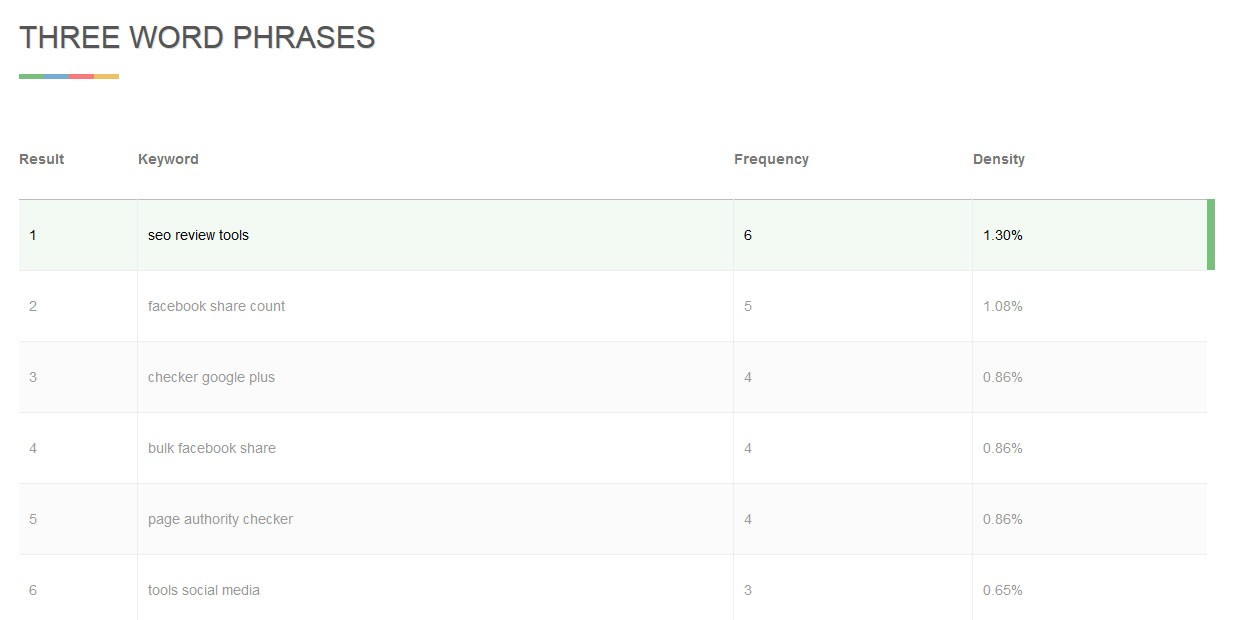
(Image Credit: SEO Review Tools)
However, there is so much more to SEO Review Tools. You can perform an automated Progressive Web App Audit with the site’s PWA testing tool and see if your site meets the requirements for PWA including reliability and speed. You can also carry out a core web vitals test with the Vitals Checker to determine if the user experience is smooth. You will know whether your site is mobile-friendly, secure, and safe for browsing. Core web metrics may not be all the rage now, but they are certainly the future because Google will use them during rankings from 2021.
If you are an SEO specialist that is wary of the Google Keyword Planner, then this software will be good for you. While the keyword planner is a good place to start, it is mainly meant for Google ads. SEO Review Tools features a keyword difficulty checker that gives insight into various aspects relating to a keyword including search volumes, trends, and suggestions that all impact how that keyword will rank.
The software also features a domain rank checker, mobile-friendly test tool, Google SEO checker, website authority checker, and website accessibility checker to help your page rank better in the search results and keep track of competitors while giving you valuable recommendations and insights on how to improve your website performance.
Diib®: Keyword Density Metrics Done Right!
Above, we have discussed some of the most useful keyword density checkers you can utilize to come up with relevant content. While keyword density is not the only important factor to consider in SEO, it can be a life-saver that can help you achieve better ranking on Google and other search engines. Diib offers a keyword research tool that will give you all sorts of information pertaining to your keywords. Here are some of the features of the our User Dashboard you’re sure to love:
- Keyword, backlink, and indexing monitoring and tracking tools
- User experience and mobile speed optimization
- Bounce rate monitoring and repair
- Social media integration and performance
- Broken pages where you have backlinks (404 checker)
- Technical SEO monitoring
Click here for your free scan or simply call 800-303-3510 to speak to one of our growth experts.
FAQ’s
Our Diib Growth Experts recommend a keyword density between 1-2%. This means your target keyword needs to appear 1-2 times every 100 words of your article. This will show search engines, like Google, what your page contains without risking a penalty for keyword stuffing.
The formula to calculate the keyword density is simple. The total number of times a keyword is used divided by the total number of words. This number is your keyword density. Simple!
First off, you should only use keywords that are relevant to the page content you’re working on. As a good rule of thumb, don’t use more than 20 keywords per page regardless of whether the ideal density matches up with the content you’re writing. Above all, you want your content to read easily and make sense.
To find your keyword volume, you’ll want to use a volume checker. There are so many out there. You simply copy and paste your keyword list into the checker. In fact, Diib’s keyword research tool will give you the search volume for your own keywords along with that of your competitors.
The keyword difficulty of a given keyword or phrase is the measure of how difficult it would be to rank above your competitors for that keyword/phrase in a search query.



